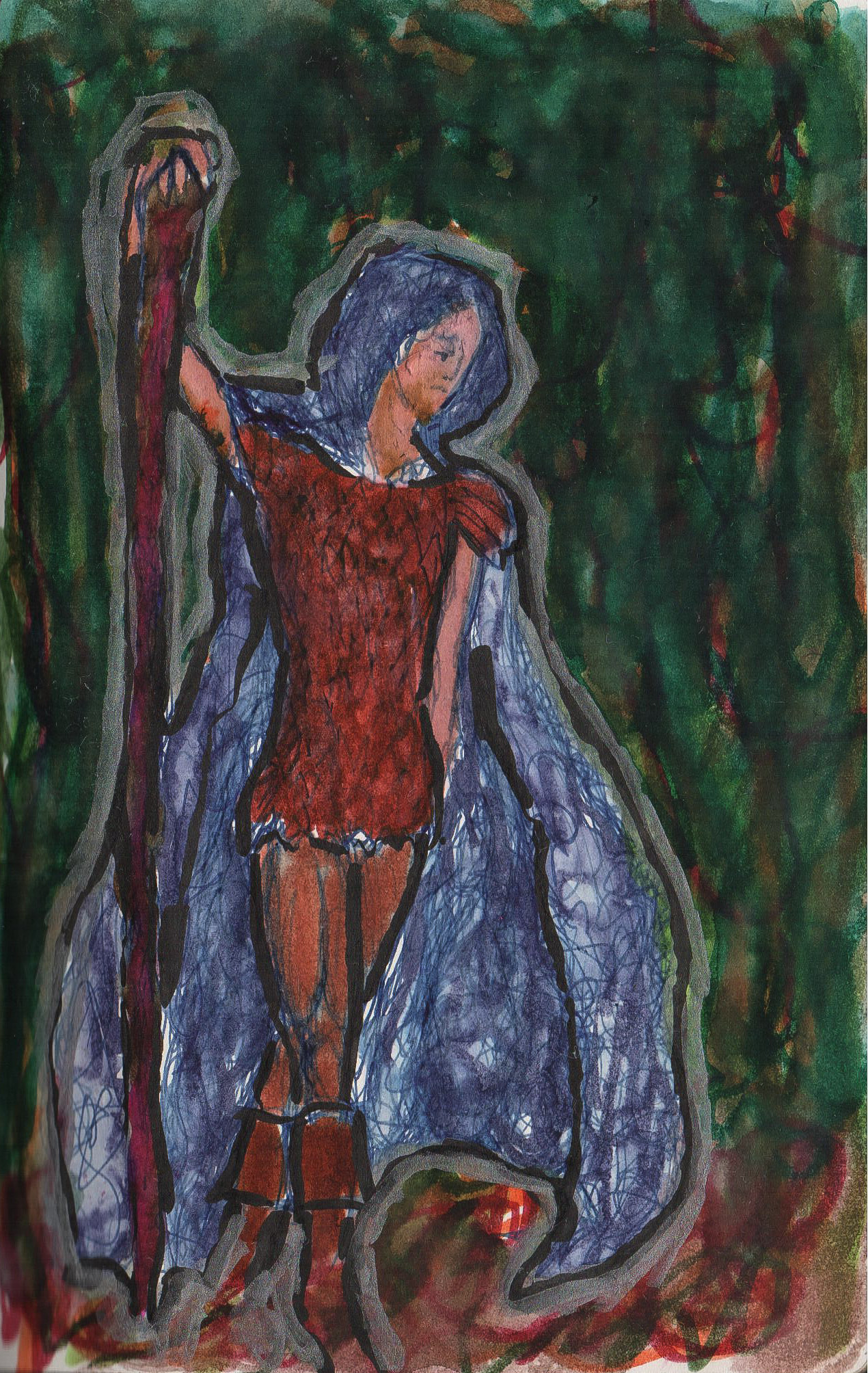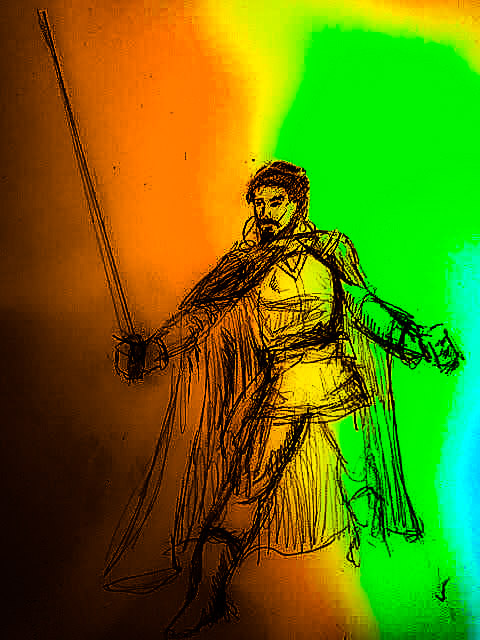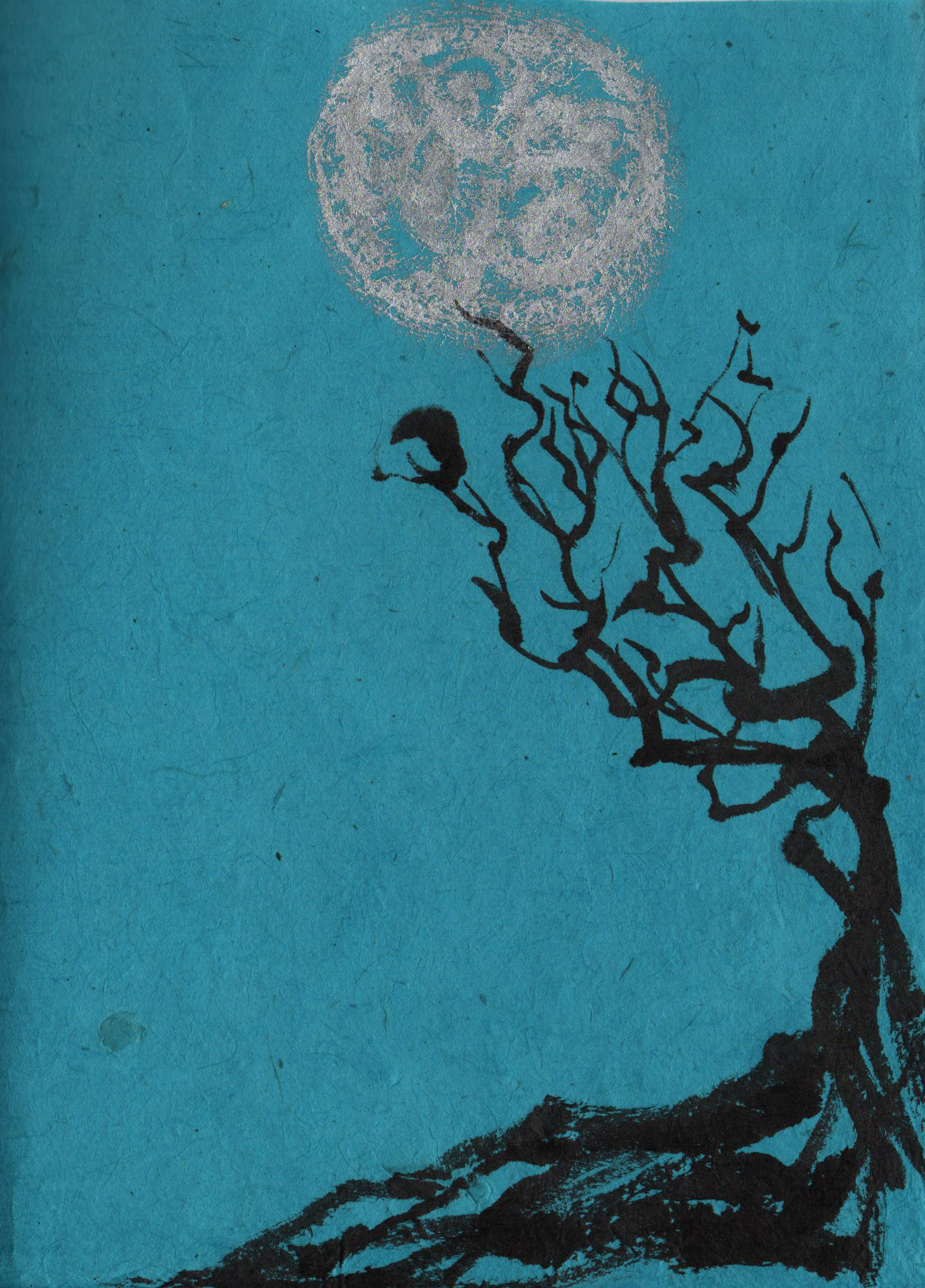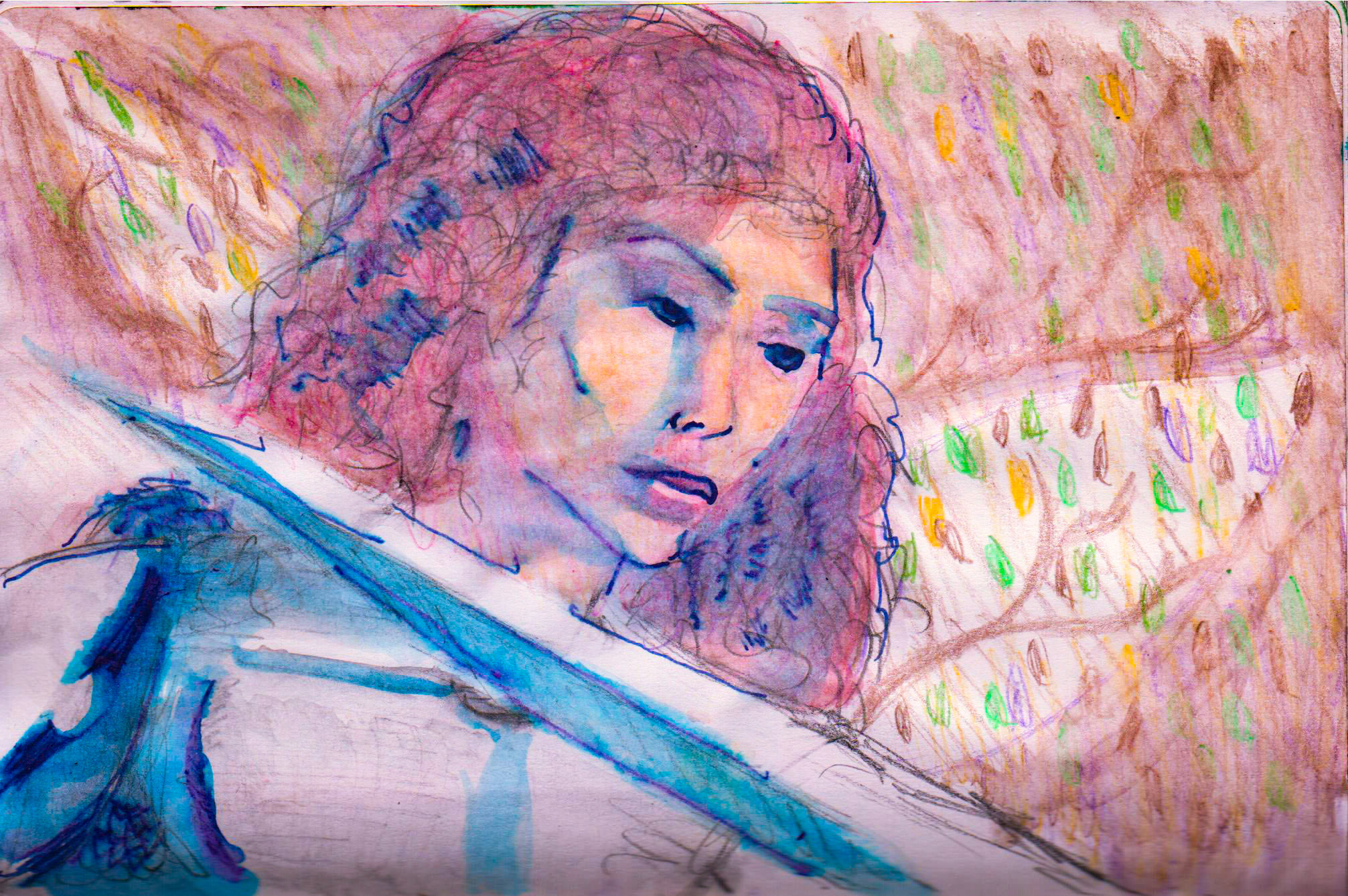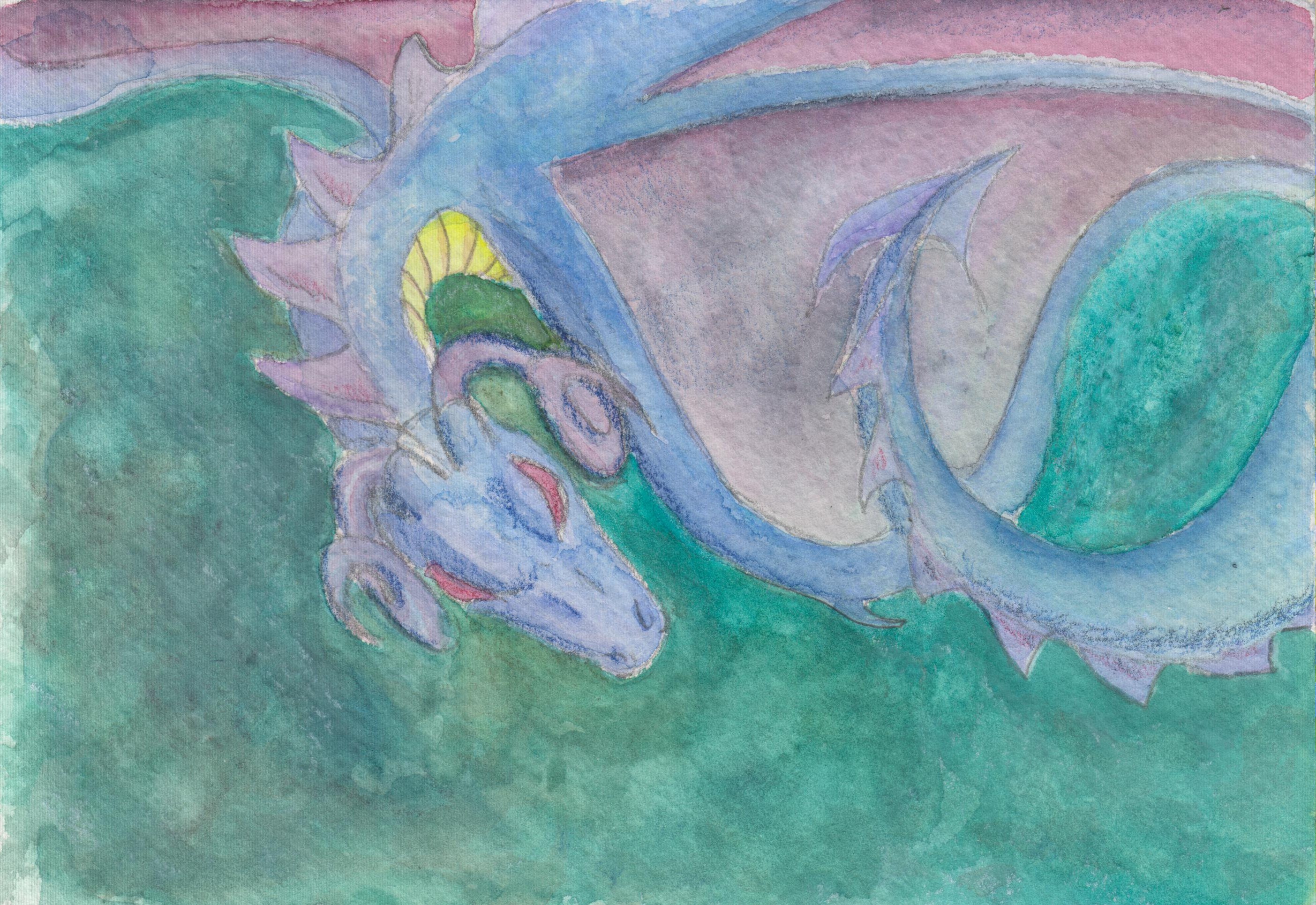

Yendor sat underneath the old ocherfruit tree. It was early spring, and the branches were budding with their flowers. the tiny blossoms looked like a million candle flames alight on the tree, with bright red at the base the petals and a translucent yellow that was much more brilliant than the dusky fruit that would come later, topping each petal. The scent they gave off was like honey mixed with berries and new grass; a sweet earthy scent that called to the hummingbirds who all said, “mmmmmm” approvingly. The gnarled bark was a deep, rich brown that seemed burned in the crevices but burnished on its high spots. The bark seemed to weave in and out of itself like a crazed basket that decided to become a tree and took root in the new yellow green grass and sprung out, reaching for the heavens all the while being shaped by the wind. The branches arched out in every direction as if it were caught stretching and yawning one morning and just continued to grow into that pose.
The air was cool that morning caressing the young leaves of grass and whispering in Yendor’s ear. “Shhhhhhh….”
He could hear the guards coming before he could see them. They hadn’t heard the morning breeze’s whisper. He had scouted the camp in the night and he knew this area would be patroled. It was the farthest point from the camp that the patrol covered. The guards came out of the grove, their deep red uniforms seeming to emerge from the shadows ahead of them. Yendor sat still. The sun was behind him, and he was dressed in his black leathers. even with his golden hair curling around him, they didn’t see him. “Hello, boys.” he said. He was still working on a “calling card” greeting.
The guards stopped and stared at him, frowning at this unexpected encounter. Yendor stood in a smooth fluid motion, using only his legs, which had the effect of appearing to have levitated up out of the ground. He smiled, bowed his head slightly in greeting, pulled out his sword and killed them both before they could respond. He had stabbed them each in the abdomen and curved his thrust in and up under the ribs, and rupturing the heart, so quickly that the second man was dead before the first man’s heart had stopped. First the man on his left, then the one on his right; one, two, done. No magick, just concentration, and execution, so to speak.
Now he had about ten minutes before they were due to report after completing their rounds. This would be the only break he got, he knew. He approached the fence near the rear of the camp, away from the gate. It wasn’t a blind spot but it was as close to it as he was going to get. The prisoners filled the yard. They were over capacity by quite a margin. Clearly the prisoners had to sleep out in whatever weather there was. They were a gray, ragged mass of a mess. Danse was in there somewhere, just another outlaw, waiting for sale. They sold the young and able into slavery, the others they put to work there in the camps. Everyone worked until they dropped. They were underfed, sick and exhausted. There was a twenty foot clearing around the camp and Yendor burst out of the trees at a sprint and headed straight for the fence. It was made of thick wire which criss crossed in four inch squares. Yendor cut through the wire with a downward swoop and instead of beckoning out the prisoners, he entered the prison camp. A few prisoners close by just stared at him. He motioned his head toward the opening but that was it. They would figure it out.
There was relative quiet; the prisoners milling about, the guards mostly gossiping with each other, only taking note of the prisoners to inflict some petty cruelty upon them. He tried to intuitively divine where Danse was. It was almost not magick. Just follow your gut, your nose, only slightly more accurate. So far, he was undetected. Mostly hidden by the mass of prisoners and walking with a sense of belonging. That might have been the first trick he had ever learned. If you’re sneaking around, you look suspicious, but if you walk around like you belong there, no one pays you any mind. That trick had gotten him many a midnight snack from strange kitchens growing up touring the faires. Yendor walked with such purpose that some guards saw him and nodded to him in deference. Perhaps they were used to visitors here. Apparently of high rank. Probably came to buy slaves. High ranking officials would probably get special treatment and be able to visit the camps rather than wait for market days like everyone else.
The prisoners were the poorest of the poor. To the sorcorers the people of the world were there for the taking. They were like animals to be used or eradicated as vermin. Anyone who wasn’t fair, from the northern isles, women, pagans, heathens, anyone who didn’t worship Incarnate as a god. The Sorceral, they called the church. People could be outlawed for nearly any excuse. Not able to pay taxes was the main reason, but fines for any infraction, often made up. was another. The sorcerers saw the world as overpopulated and poor, brown people were more valuable as slaves than free. Waters had been given his freedom long before Yendor had met him. He carried a medalian around his neck that bore the symbol of his former master to prove he was a free man. Even so, any one of rank could simply take that medalian from him and put him right back into slavery, either as his own or for sale. It was only that Waters surrounded himself with people and carried himself with a special dignity that kept him free. Even so, he had to be careful. There had been some run ins Yendor remembered from his childhood, that he hadn’t understood at the time. In fact it wasn’t until right now, in this camp, that Yendor began to fully understand the severity of the situation Waters had faced. Indeed, nearly anyone could be put into a camp. Even a noble, if he crossed a sorcerer. Or even a sorcerer if a higher ranking sorcerer so decided. Only Incarnate himself was safe from such a fate.
Such camps were everywhere. Yendor had passed by countless ones, but never been inside one. Always one believed that it couldn’t happen to them, and that those it did happen to somehow deserved it. It was the only way to go on with life. Yendor had been in the resistance. Those armies were always crushed, utterly, but always they sprung up again as common as these prison camps and now Yendor could see why. Even with the hopelessness of the cause, there was a certain appeal to fighting against this way of life. Perhaps there was a way to unite each of the little armies into a single army. If they struck at the same time from their various places across the world, even the sorcerers could not defend such an attack.
“You, boy!” Yendor was pulled back into the present when he realized he was being addressed by a guard. He turned with a bit of a pout on his face, and looked down his nose at the guard. “What’s your business here?” At least the guard didn’t mistake him for a prisoner, yet.
Yendor affected a high brow accent, “Shopping.” he sneered. and approached the guard. “Maybe I’ll take you.”
“Oy! I’m not for sale!” said the guard defensively.
“Pity.” said Yendor, pulling his sword, which had been sheathed behind his cloak, and dispatched the guard in the same manner as he had his compatriots outside the camp. These people imprisoned Danse, and he had no compunction that he would have to eliminate as many as possible to get out alive.
At that moment a horn sounded from where he had entered the camp. So they had found the breech. His masquerade as a noble would be useless from here on out. “Breech in the perimiter!” he shouted, mimicking the voice of the guard he had just killed. If the prisoners rushed the fence, and the guards focused their attention on that it would give him some cover. Shouts of “Freedom” began to go up throughout the camp, and Yendor wished he had made more of this earlier, but had reasoned if the guards weren’t alerted to the breech, more people would be able to escape. Now he had to find Danse and get out of there.
“Danse!” he called, but a cacophony had arrisen from the chance of escape and he couldn’t even hear himself. He cursed himself for not having more of a plan. for not having become more of a wizard before making this attempt. He had allowed his fear to cause him to act recklessly and now he might not find her. In fact, he had put her and everyone here in danger, and he only now saw that. He had been willing to sacrifice as many of these prisoners as needed to find Danse, as if they were pawns in his plan. He was no better than the sorcerers.
He lifted his sword to the sky, “DANSE!” He shouted, as lightning came down and struck his sword and lit up his nervous system like a ghost. Where a moment before he had been lost in the chaos, now a wide circle opened up around him. Most of the guards were human. The Officers had sorcerers in their ranks no doubt, but ones whose power was limited and so pursued a career in the prisons where they could rise farther than if they had to compete with more talented magicians. Still, these officers wore the red insignia of sorcerer over their uniforms, and considered themselves powerful among the powerless.
These officers made their way to the circle and appeared simultaneously surrounding Yendor. He released the lightning he had absorbed and it coursed out of him through his arms, but also out from his heart, striking the sorcerers all at once, eliminating that threat. Now the chaos really set in as the prisoners tried to escape the magic. Most people had only ever experienced magic from sorcerers and didn’t even contemplate the idea that it could come from someone else. The prisoners overwhelmed the guards, outnumbering them by the hundreds, and in their panic, made good their escape. The shrieks and savagery escalated still further. And there was no sign of Danse. She had not understood the bolt. Perhaps she wasn’t even here after all.
In the end, there were the bodies of the fallen, both outlaw and guards. Yendor stood awhile longer at the center of the circle of sorcerers laid out before him in each direction.

